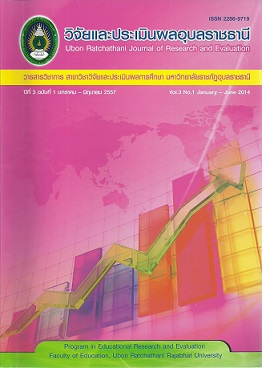A Development of The Causal Relationship Model of Variables Influencing The Science Achievement of Matthayom Suksa 4 Students in Si Sa Ket Province
Keywords:
การพัฒนารูปแบบความสัมพันธ์เชิงสาเหตุ ผลสัมฤทธิ์ทางการเรียนวิชาวิทยาสตร์ ตัวแปรที่ส่งผลต่อ ผลสัมฤทธิ์ทางการเรียนวิชาวิทยาศาสตร์Abstract
The purposes of this research were to develop the causal relationship model of variables influencing the science achievement of Matthayom Suksa 4 students in Si Sa Ket province and examining the goodness of fit model with the empirical data.
The samples used in this research were 445 Matthayom Suksa 4 students in Si Sa Ket province in the second semester of the academic year 2012, randomly selected by multi-stage random sampling. The instruments used for data collecting were seven multiple choice tests ; the science achievement test , the science process skills test, the verbal comprehension aptitude test, the number aptitude test, the space aptitude test, the memory aptitude test and the reasoning aptitude test. These tests had the reliability value ranging from .920 to .970. Two summated rating scales questionnaire; the scientific mind scale and the friend group relationships scale. These scales had the reliability value of .985 and .980, respectively. For the construct validity of the research tools. Data were analyzed using Structural Equation Model to computerize, by means of arithmetic mean , standard deviation, simple correlation, confirmatory factors analysis, and causal correlation analysis.
The research findings were as follows :
The causal relationship model Influencing the science was fitted with the empirical data. And the variables influencing the science achievement included ; verbal comprehension aptitude exert direct and indirect effects pass entry knowledge and science process skills, number aptitude exert direct and indirect effects pass entry knowledge, space aptitude exert indirect effects pass entry knowledge and science process skills, memory aptitude exert direct and indirect effects pass entry knowledge and scientific mind, reasoning aptitude exert direct and indirect effects pass science process skills and scientific mind, friend group relationships exert indirect effects pass entry knowledge and scientific mind, entry knowledge exert direct, science process skills exert direct and indirect effects pass entry knowledge and scientific mind exert direct and indirect effects pass science process skills.
References
คนึงนิจ พันธุรัตน์. การศึกษาตัวแปรสาเหตุที่มีอิทธิพลต่อผลสัมฤทธิ์ทางการเรียน วิชาวิทยาศาสตร์ของนักเรียนระดับชั้นมัธยมศึกษาปีที่ 4 โรงเรียนสาธิตมหาวิทยาลัยขอนแก่น. วิทยานิพนธ์
ศึกษาศาสตรมหาบัณฑิต มหาวิทยาลัยขอนแก่น, 2545.
จันทนี เทือกทอง. ตัวแปรพหุระดับที่มีอิทธิพลต่อผลสัมฤทธิ์ทางการเรียนวิทยาศาสตร์ของนักเรียนมัธยมศึกษาตอนปลาย. วิทยานิพนธ์ปรัชญาดุษฎีบัณฑิต มหาวิทยาลัยรามคำแหง, 2550.
ดำเนิน ยาท้วม. ผลการจัดการเรียนรู้กลุ่มสาระวิทยาศาสตร์ สำหรับนักเรียนชั้นมัธยมศึกษาปีที่ 4 ด้วยวัฎจักรการเรียนรู้ร่วมกับการสะท้อนอภิปัญญา และวัฏจักรการเรียนรู้ร่วมกับการสะท้อนอภิปัญญาและความตระหนักรู้. ปริญญานิพนธ์การศึกษาดุษฎีบัณฑิต มหาวิทยาลัยศรีนครินทรวิโรฒ, 2548.
ทิศนา แขมมณี . ศาสตร์การสอน : องค์ความรู้เพื่อการจัดกระบวนการเรียนรู้ที่มีประสิทธิภาพ. พิมพ์ครั้งที่ 11. กรุงเทพฯ : จุฬาลงกรณ์มหาวิทยาลัย, 2552.
ปาริชาติ เบ็ญจวรรณ. ปัจจัยเชิงสาเหตุที่ส่งผลต่อจิตวิทยาศาสตร์ของนักเรียนช่วงชั้นที่ 4 สังกัดสำนักงานเขตพื้นที่การศึกษากรุงเทพมหานคร เขต 2. ปริญญานิพนธ์การศึกษามหาบัณฑิต มหาวิทยาลัย
ศรีนครินทรวิโรฒ, 2551.
พิชญา สืบนุการณ์. การพัฒนารูปแบบความสัมพันธ์เชิงสาเหตุของตัวแปรที่ส่งผลต่อผลสัมฤทธิ์ทางการเรียนวิชาวิทยาศาสตร์ของนักเรียนชั้นมัธยมศึกษาปีที่ 4 ในจังหวัดศรีสะเกษ. วิทยานิพนธ์ครุศาสตร
มหาบัณฑิต มหาวิทยาลัยราชภัฎอุบลราชธานี, 2556.
วัชรา จรูญผล และคนอื่นๆ. การวิเคราะห์พหุระดับของตัวแปรที่มีอิทธิพลต่อผลสัมฤทธิ์ทางการเรียนวิทยาศาสตร์ของนักเรียนชั้นมัธยมศึกษาปีที่ 3. ปริญญานิพนธ์วิทยาศาสตรมหาบัณฑิต มหาวิทยาลัยบูรพา, 2549.
ส่งเสริมการสอนวิทยาศาสตร์และเทคโนโลยี, สถาบัน. การจัดสาระการเรียนรู้กลุ่มวิทยาศาสตร์ หลักสูตรการศึกษาขั้นพื้นฐาน. กรุงเทพฯ : โรงพิมพ์คุรุสภาลาดพร้าว, 2546.
. ปัจจัยที่ทำให้ระบบโรงเรียนประสบความสำเร็จ. กรุงเทพฯ : อรุณการพิมพ์, 2554.
สุขกฤษ์ ดีโนนโพธิ์. ปัจจัยเชิงสาเหตุที่มีอิทธิพลต่อผลสัมฤทธิ์ทางการเรียนวิชาวิทยาศาสตร์ของนักเรียนชั้นมัธยมศึกษาปีที่ 3. วิทยานิพนธ์ครุศาสตรมหาบัณฑิต มหาวิทยาลัยราชภัฏชัยภูมิ, 2554.
สุรางค์ โค้วตระกูล. จิตวิทยาการศึกษา. พิมพ์ครั้งที่ 8. กรุงเทพฯ : สำนักพิมพ์แห่งจุฬาลงกรณ์, 2552.
อัจฉรา บุญสุข. ปัจจัยเชิงสาเหตุที่ส่งผลต่อผลสัมฤทธิ์ทางการเรียนวิชาวิทยาศาสตร์ของนักเรียนชั้นมัธยมศึกษาปีที่ 4 สังกัดสำนักงานเขตพื้นที่การศึกษาเพชรบูรณ์ เขต 2. วิทยานิพนธ์ครุศาสตร
มหาบัณฑิต มหาวิทยาลัยราชภัฏเพชรบูรณ์, 2553.
Bloom, Benjamin S. Human Characteristics and School Learning. New York : McGraw – Hill Book Company, 1976.
Glassman, Naftaly S. and Biniaminov, Israel. “Input-Output. Analysis of School,” Review of Educational Research. 51(Winter 1981) : 509-539.
Harnischfeger, Anegret and Wiley, David E. “Conceptual Issues in Model of School Learning,” Journal of Curriculum Studies. 10(April 1978) : 215 – 231.
Downloads
Published
How to Cite
Issue
Section
License
1. บทความที่ตีพิมพ์ในวารสารนี้ได้มีการตรวจสอบการลอกเลียนงานวรรณกรรมแล้ว ไม่เกินร้อยละ 25
2. บทความที่ตีพิมพ์ในวารสารนี้เป็นข้อคิดเห็น ข้อค้นพบของผู้เขียนบทความ โดยผู้เขียนบทความต้องเป็นผู้รับผิดชอบต่อผลทางกฎหมายใด ๆ ที่อาจเกิดขึ้นจากบทความนั้น ๆ
3. บทความ ข้อมูล เนื้อหา รูปภาพ ฯลฯ ที่ได้รับการตีพิมพ์ในวารสารวิจัยและประเมินผลอุบลราชธานี ถือเป็นลิขสิทธิ์ของวารสารวิจัยและประเมินผลอุบลราชธานี หากบุคคลหรือหน่วยงานใดต้องการนำทั้งหมดไปเผยแพร่ต่อหรือเพื่อกระทำการใดๆ จะต้องได้รับอนุญาตเป็นลายลักษณ์อักษรจากวารสารวิจัยและประเมินผลอุบลราชธานีก่อนเท่านั้น และจะต้องมีการอ้างอิงวารสารวิจัยและประเมินผลอุบลราชธานี ฉบับนั้น ๆ ด้วย






